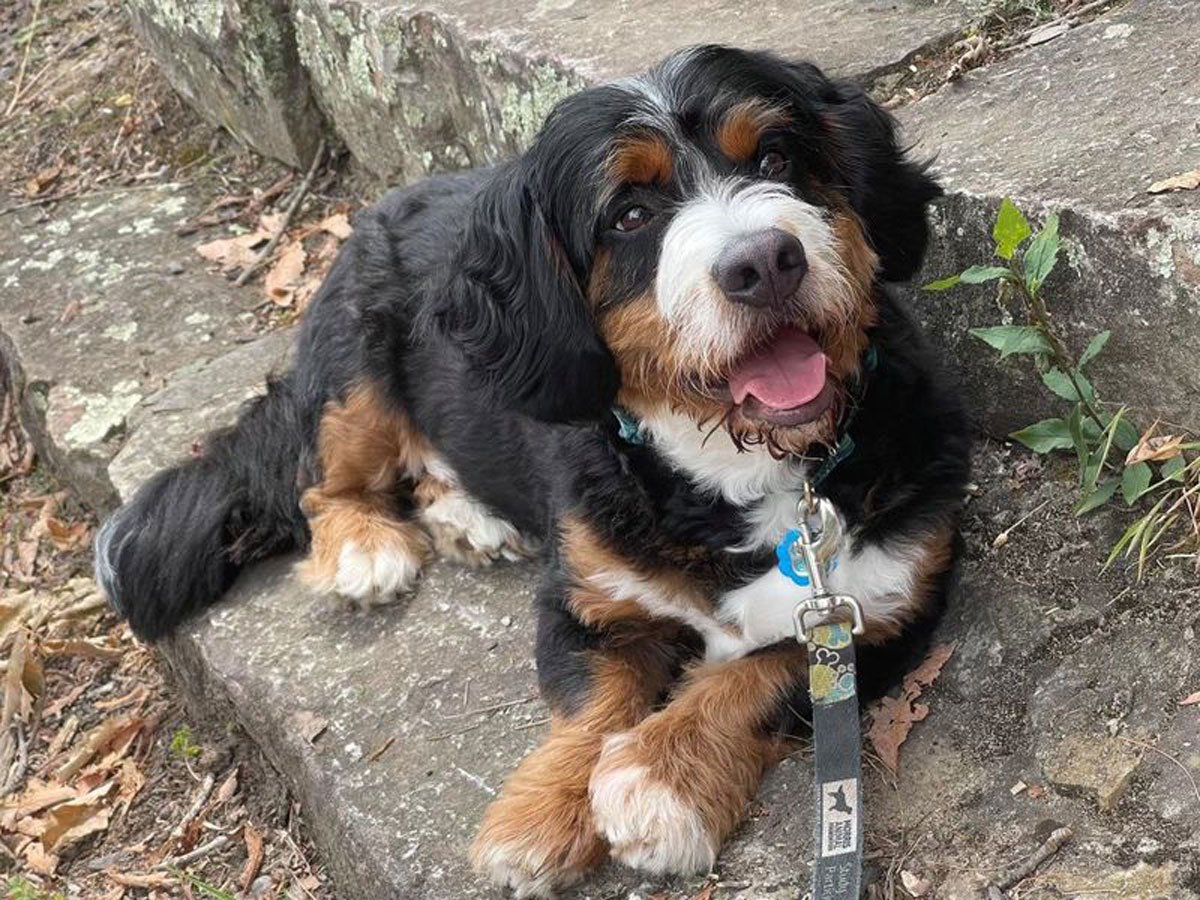Bernese Mountain Dogs are renowned for their gentle demeanor and affectionate nature. However, their large size and high energy levels, especially as puppies, can sometimes be overwhelming for owners. One common question among Bernese Mountain Dog owners is: when do they calm down? In this comprehensive guide, we’ll explore the factors influencing the calming down process in Bernese Mountain Dogs and provide practical tips for managing their energy levels.
Understanding Bernese Mountain Dogs

Before diving into when Bernese Mountain Dogs calm down, it’s essential to understand their breed characteristics.
Personality and Temperament
- Gentle Giants: Bernese Mountain Dogs are often described as gentle giants due to their large size and friendly demeanor.
- High Energy: As puppies, Bernese Mountain Dogs can exhibit high levels of energy, often bouncing from one activity to another.
- Watchful and Protective: They make excellent watchdogs and are known for their protective instincts towards their families.
Factors Influencing When Bernese Mountain Dogs Calm Down

Genetics
Breed Characteristics:
- Bernese Mountain Dogs have a genetic predisposition towards certain traits, including energy levels and temperament.
- Their ancestry as working dogs bred for farm work in the Swiss Alps contributes to their natural inclination towards being active and energetic.
Individual Differences:
- While breed characteristics provide a general framework, individual dogs within the breed may vary in their energy levels and behavior.
- Factors such as lineage, breeding history, and genetic diversity can influence the temperament and energy levels of Bernese Mountain Dogs.
Training and Socialization
Positive Reinforcement:
- Training methods based on positive reinforcement, such as rewards and praise for desired behaviors, can shape a Bernese Mountain Dog’s response to various stimuli.
- Consistent and patient training encourages the development of desirable behaviors and promotes obedience.
Early Socialization:
- Exposing Bernese Mountain Dog puppies to diverse environments, people, and animals from a young age is essential for proper socialization.
- Positive experiences during the socialization period help puppies develop confidence, reduce fearfulness, and establish healthy interactions with their surroundings.
Exercise and Activity Levels
Physical Exercise:
- Bernese Mountain Dogs have considerable energy reserves and require regular physical exercise to maintain their health and well-being.
- Activities such as walking, running, hiking, and playing fetch allow them to release pent-up energy and engage in natural behaviors.
Mental Stimulation:
- In addition to physical exercise, Bernese Mountain Dogs benefit from mental stimulation to prevent boredom and promote cognitive health.
- Interactive games, puzzle toys, and obedience training sessions challenge their minds and provide outlets for mental energy.
Age and Development
![30 Best Dog Names For Beautiful Bernese Mountain Dogs [PICTURES] | Cute dogs, Baby dogs, Dog pictures](https://i.pinimg.com/564x/1c/a8/d5/1ca8d5b9250603a1f7a8547cd63a6e5b.jpg)
Maturity:
- Like all dogs, Bernese Mountain Dogs undergo developmental stages as they grow from puppies into adults.
- While puppies are typically more energetic and prone to spontaneous bursts of activity, they gradually mature and exhibit calmer behavior as they reach adulthood, usually around two to three years of age.
Obedience Training:
- Consistent training and reinforcement of obedience commands play a crucial role in shaping a Bernese Mountain Dog’s behavior and maturity.
- Teaching basic commands such as sit, stay, and come, as well as addressing behavioral issues through training, helps establish boundaries and expectations for the dog.
Medical Considerations
Thyroid Issues:
- Bernese Mountain Dogs are predisposed to certain health conditions, including thyroid-related issues such as hyperthyroidism.
- Thyroid imbalances can affect metabolism, energy levels, and overall behavior in dogs, potentially contributing to hyperactivity or lethargy.
Veterinary Care:
- Regular veterinary check-ups are essential for monitoring the health and well-being of Bernese Mountain Dogs.
- Early detection and management of medical conditions, including thyroid disorders and other health issues, can support the dog’s overall health and contribute to a balanced temperament.
Tips for Managing Energy Levels in Bernese Mountain Dogs

Establishing a Routine
Consistent Schedule:
- Establishing a consistent daily routine for feeding, exercise, training, and rest provides structure and stability for Bernese Mountain Dogs.
- Predictability helps reduce anxiety and uncertainty, promoting a sense of security and well-being in the dog.
Regular Exercise:
- Bernese Mountain Dogs require ample opportunities for physical exercise to expend their energy and maintain optimal health.
- Incorporating daily walks, outdoor activities, and play sessions into their routine helps fulfill their need for physical activity and prevents boredom.
Providing Adequate Exercise
Variety in Activities:
- Engaging in a variety of activities, such as walking, running, hiking, swimming, and playing fetch, prevents boredom and stimulates both body and mind.
- Rotating activities keeps Bernese Mountain Dogs mentally stimulated and prevents them from becoming accustomed to a monotonous routine.
Interactive Play:
- Interactive play sessions, such as tug-of-war, fetch, and agility games, provide mental stimulation and encourage physical activity.
- Incorporating toys and games that challenge the dog’s problem-solving skills and coordination enhances their overall well-being.
Creating a Calm Environment
Minimizing Stimuli:
- Limiting exposure to loud noises, chaotic environments, and excessive stimuli helps reduce stress and overstimulation in Bernese Mountain Dogs.
- Providing a calm and peaceful atmosphere at home promotes relaxation and supports the dog’s emotional well-being.
Calming Techniques:
- Utilizing calming techniques, such as playing soft music, using soothing scents like lavender, and providing cozy resting areas, creates a tranquil environment for Bernese Mountain Dogs.
- Incorporating relaxation techniques into their daily routine helps them unwind and recharge after periods of activity.
Socialization and Training

Positive Experiences:
- Exposing Bernese Mountain Dogs to a variety of social situations, people, and animals from a young age promotes confidence and reduces anxiety.
- Positive interactions and experiences during socialization contribute to the development of well-adjusted and sociable dogs.
Obedience Training:
- Enrolling Bernese Mountain Dogs in obedience classes or working with a professional trainer reinforces obedience commands and encourages desirable behaviors.
- Training sessions provide mental stimulation and strengthen the bond between owner and dog, fostering mutual trust and respect.
Veterinary Care
Regular Check-ups:
- Scheduling routine veterinary visits allows for monitoring the dog’s health and addressing any medical concerns promptly.
- Regular check-ups help detect and manage potential health issues, ensuring the dog’s overall well-being and vitality.
Consultation:
- Consulting with a veterinarian about the dog’s energy levels and behavior provides valuable insight into potential underlying medical conditions or behavioral issues.
- Veterinary guidance and support enable owners to make informed decisions regarding their Bernese Mountain Dog’s care and management.
Conclusion
While Bernese Mountain Dogs may take some time to calm down, with patience, training, and proper care, they can develop into well-behaved and content companions. Understanding the factors influencing their behavior, such as genetics, training, and health, is key to managing their energy levels effectively. By providing adequate exercise, socialization, and a structured environment, you can help your Bernese Mountain Dog transition into a calm and balanced adult. Remember, every dog is unique, so tailor your approach to suit your dog’s individual needs and personality. With love, patience, and consistency, you can enjoy a harmonious relationship with your Bernese Mountain Dog for years to come.

